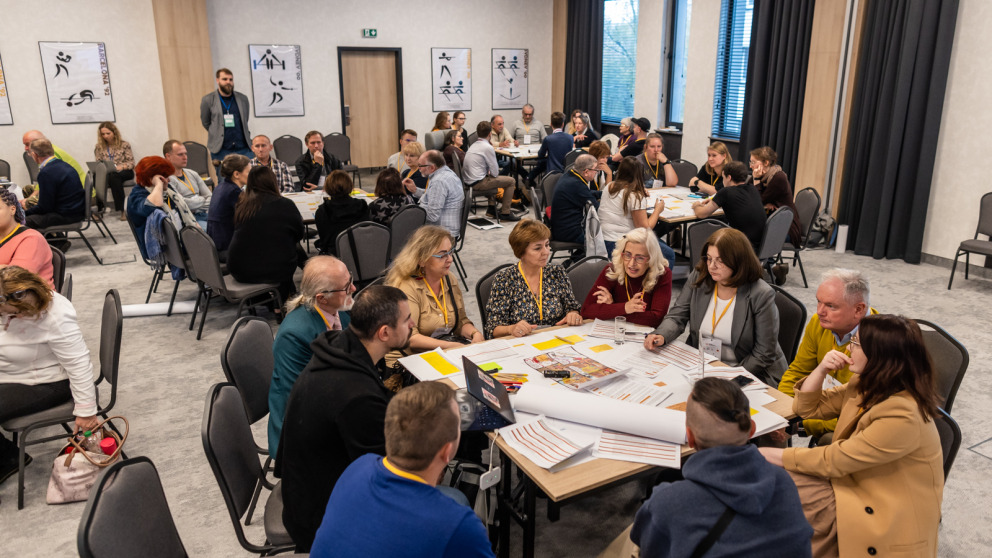The Advisory Role of Citizens’ Assemblies in Germany and Poland
11.03.2024

In a new publication we examine how citizens contribute to contemporary policy advice through citizens' assemblies – a form of public participation that has become increasingly popular in Germany and Poland in recent years.
Citizens are rarely involved in traditional forms of policy advice. But this is beginning to change and one could almost speak of a “participatory turn”, underpinned by the emergence of forms of policy and social consultation that afford citizens a more active role. Whether political decision-makers harness the full potential of citizens’ expertise depends to a large degree on how assemblies are initiated and conducted.
Putting citizens’ expertise to work
In a contribution to a new anthology, my colleague Daniel Oppold and I analyze citizens' assemblies from this perspective and consider whether they can be considered an independent form of public consultation to advise policymakers. A closer look at some citizens' assemblies previously held in Germany and Poland shows that this format is well-suited to enhance and expand the contemporary policy advice landscape. Specifically, citizens’ assemblies can create spaces in which the views of citizens selected by lottery take centre-stage alongside the collaborative development of policy recommendations. These spaces of discourse and their outputs enable policymakers – and society at large – to tap into citizens' experiential knowledge and thus differ considerably from other forms of public consultation.
However, the success of efforts to tap into this potential depends on a number of factors that influence both the quality of the process and the resulting recommendations. While the interactions and input provided by citizens are crucial, it is important not to overlook the broader circumstances surrounding the process and its preparation. The legal standing of the process and its integration within the democratic institutional ecosystem are particularly important, for example.
Involving citizens’ assemblies in decision-making processes
Our research covered a range of Polish, German and international case studies. We were interested to note that in several cases, citizens’ assemblies were granted mandates that went beyond a purely advisory capacity. In Poland, for example, some leaders in local government pledged to implement recommendations that received the backing of over 80 percent of a citizens’ assembly. Putting this into practice has proved tricky at times, but this commitment on the part of democratically elected officials and bodies adds substantial weight to public participation processes and shifts some decision-making power to the public – as represented by the citizens’ assembly – albeit indirectly. With this development, citizens’ assemblies are pushing at the limits of policy advice and social consultancy. By granting them a stake in decision-making, these political actors have recognized citizens’ assemblies – unlike expert commissions or stakeholder participation processes – as a form of deliberative democracy with the capacity to deliver outcomes with a legitimacy similar to that of representative democracy.
However, even if most citizens' councils operate in a purely advisory capacity, they can still provide valuable input to guide decision-making processes and enrich the public debate on tackling various challenges facing society by generating additional options. In order to avoid frustration or disappointment among those involved, it is important that organisers clarify in advance, how the recommendations of an assembly will be taken up by political actors and local authorities, and establish a clear role for the assembly within the political landscape and public discourse. In practice, this is best achieved when assemblies are called – ideally by mutual agreement – through relevant representative democratic bodies (district and city councils at the municipal level, for example) and their aims are clearly communicated to the public. In addition, the question(s) put to the citizens’ assembly should also be developed in a participatory planning process that takes different perspectives, ideas and experiences into account.
Bottom-up initiatives show potential
Citizens' assemblies are frequently initiated by civil society organisations. Both Germany and Poland have seen national citizens' assemblies that were initiated “from the bottom up”. The initiators hoped to harness the potential of citizens’ assemblies by targeting political windows of opportunity and organizing large campaigns that flanked the participation process. In Germany, for example, the “Mehr Demokratie” association and others initiated the “Citizens' Assembly for Democracy” and pioneered this form of public participation and consultation at the federal level, generating widespread interest in the format and stimulating a broad debate on the possibilities of expanding the existing institutional landscape. The "Citizens' Assembly on Germany's Role in the World" subsequently convened by the Bundestag and the announcement by the governing coalition that it would consider making assemblies a permanent fixture can be attributed to the success of the "Citizens' Assembly on Democracy".
The bottom-up national citizens' assembly on energy costs in Poland followed a similar arc by taking up a pressing issue to demonstrate that consultations involving a group of randomly selected citizens, supplemented by input from experts, could generate helpful ideas and identify potential solutions. Following in the footsteps of previous successes at the municipal level, the national citizens’ assembly anchored the concept in public consciousness and led to further assemblies at the national level.
You can find out more in our publication about how citizens' assemblies can capture and amplify the voices of civil society to support socio-political discourse and decision-making:
- Oppold, D., & Stasiak, D. (2024). Bürger(räte) in der Politikberatung in Deutschland und Polen. In A. Kopka, & D. Piontek (Eds.), Politische Expertenkultur in Deutschland und Polen (pp. 367-388). Wiesbaden: Springer Fachmedien Wiesbaden. https://doi.org/10.1007/978-3-658-43365-9_15
- Stasiak, D., & Oppold, D. (2022). Głos doradczy społeczeństwa: panele obywatelskie w Niemczech i Polsce. In A. Kopka, & D. Piontek (Eds.), Polityczna kultura ekspercka w Polsce i w Niemczech. Politycy, doradcy i lobbyści w perspektywie porównawczej (pp. 333-353). Poznań: Wydawnictwo Naukowe Wydziału Nauk Politycznych i Dziennikarstwa Uniwersytetu im. Adama Mickiewicza.
